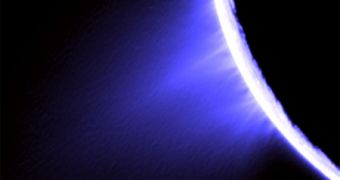Since the Cassini spacecraft sent back images showing the freezing moon Enceladus, around Saturn, spewing out vapors of water, the international astronomical community has entered a frenzy, and also a heated scientific debate. Some scientists argue that the observations prove there is an ocean of liquid water under the moon's ices, which boils and emits the vapors through cracks in the surface. On the other hand, another group argues that there is no liquid ocean, and that the vapors are formed through sublimation, where a solid turns directly into a gas, Space reports.
Establishing whether Enceladus has a liquid ocean or not is of vital importance for future space explorations. If such a body of water indeed exists, then the possibility of the moon holding water increases significantly. This could make it a possible target for future space missions, aimed at looking for signs of organic matter under the ice. Conversely, if all the surface is covered in thick, solid ice, then there are little to no chances of some forms of life existing on the moon.
“We simply redid the calculations described in the [previous] paper and found that we could not reproduce the results quoted for either the abundance of vapor or the abundance of ice. Our conclusion was that sublimation should not have been excluded from consideration as a process that could produce the measured quantities, and thus should be considered as thoroughly as the liquid water hypothesis. Unfortunately, it has not been,” University of Illinois in Urbana-Champaign (UI) expert Susan Kieffer says.
She led a team that published a new study on Enceladus, which appears in the May 2009 issue of the scientific journal Icarus. The new conclusions were drawn from the same ice-to-vapor ratio measurements Cassini sent back, only this time the calculations yielded completely different results than those another research team got. “Water is certainly present in Enceladus, at least as solid and vapor, but the presence of vapor does not necessarily imply that liquid water is present. A definitive answer about the potential for life may have to await a follow-on spacecraft mission that can make specific high-resolution observations that could distinguish between the competing models,” she says.

 14 DAY TRIAL //
14 DAY TRIAL //